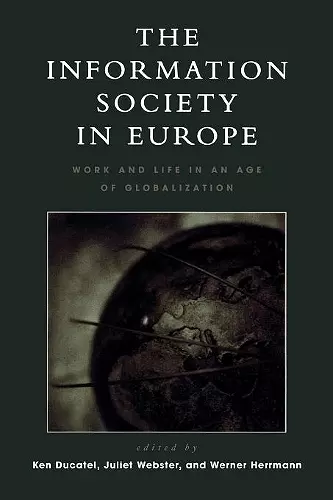The Information Society in Europe
Work and Life in an Age of Globalization
Ken Ducatel editor Juliet Webster editor Werner Herrmann editor
Format:Paperback
Publisher:Rowman & Littlefield
Currently unavailable, and unfortunately no date known when it will be back

For four decades now, information and communication technologies have been seen as principal drivers of socio-economic change. Stimulated in recent years by the Internet, the National Information Infrastructure, and European Information Society strategies, the “Information Society” has undergone a new wave of developments. In its new form, the Information Society directly affects the everyday lives of citizens, provoking concerns about the future of work, information overload, access to continuing education, surveillance, and privacy. This volume examines a wide range of issues at stake in the European Union, from employment and the labor market, to the domestication of technologies in households, to larger implications for political processes and democracy. Extending comparisons to other industrialized countries, it demonstrates that the Information Society is far too diverse and rich to be typified in simplistic dichotomies such as information “haves” and “have nots” and that simple upbeat or pessimistic responses to the new technologies are surely false messengers for the future. The authors discern general social trends and patterns in the way that these very important technologies already affect our lives and work. But they find there is still considerable room to use the technologies as a positive force for social change or, equally, to fail to take up any positive opportunities. This book helps broaden and inform communication technology debates worldwide and will be of interest to academics, students, industrialists, policymakers, and anyone who wishes to better understand the impacts of the new Information Society in Europe and beyond.
An important collection that demonstrates why European scholars have taken a leading role in the debate about the social dimensions of the revolution in information and communication technologies. Looking beyond the technology of the day, the contributions address enduring issues of significance to policy and practice in Europe and the world. -- William H. Dutton, University of Southern California, author of Society on the Line
I recommend that Americans read this book to better understand why Europeans resist following their American counterparts into a homogenized technological world. * Journal of Communication *
There are three major strengths. First, it addresses IS topics that have been neglected, including work, healthcare, learning, democracy, and gender. Second, the contributors come from various fields, including geographers, sociologists, education and technology specialists. Third, it is a goldmine of potential research topics. This book can be used in many disciplinary classes and also interdisciplinary seminars. * Progress In Human Geography *
This book illustrates neatly the broadness and pervasiveness of the concept of ‘Information Society’ by bringing together a variety of contributions on social and societal aspects of new information and communication technologies (ICTs). The flexibility of ICT use remains a characteristic emphasis of the European debate, which has been particularly rich in insights applicable to the global context. This timely volume brings to the forefront the underlying social and societal choices that face policy makers—and, for that matter, businesses—in this information age. -- Luc Soete, Maastrict Economic Research Institute on Innovation and Technology, Maastrict University
ISBN: 9780847695904
Dimensions: 225mm x 160mm x 24mm
Weight: 494g
332 pages